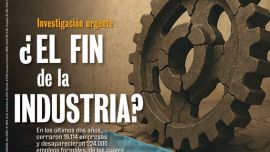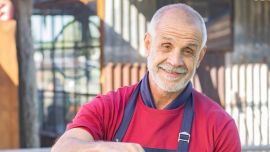P is for primaries. A is for abiertas (“open” in Spanish). S is for simultaneous. O is for obligatory. What do you get? PASO.
Yes, Argentina votes tomorrow in a presidential primary. But hold on a minute. There’s a catch. All nine political outfits fielding presidential candidates have handpicked them in advance, meaning that there will be no real internal contest.
The basic purpose of the presidential PASO, as such in this context, is that hopefuls need to garner 1.5 percent of the vote to qualify as official candidates for the first round presidential election scheduled for October. The primaries are thus perceived locally as one big public opinion poll bankrolled by the State — or at least they were for a while. As the election date neared anxiety took hold. Many observers now consider the primary a crucial step in President Mauricio Macri’s re-election bid.
So what is Macri facing? He’s up against what looks like the most united Peronist front since 2011, when then-president Cristina Fernández de Kirchner was memorably re-elected with 54 percent of the vote.
You probably know by now that Fernández de Kirchner has opted to run for vice-president. She anointed Alberto Fernández, a former Kirchnerite administration Cabinet chief between 2003 to 2008, as her presidential candidate. The nomination of an official, who quit in 2008 during the fierce standoff with farmers over export duties, has radically altered the political landscape. Macri, in response, immediately scrambled to name a Peronist running-mate: Senator Miguel Angel Pichetto, the head of the Peronist Upper House caucus in the Kirchnerite era.
After quitting, Alberto Fernández was fiercely critical of CFK’s performance as head of state. But Pichetto, in contrast, did not relinquish his Senate seat and kept on whipping, right up to the very end of CFK’s mandate in 2015. A snap of CFK’s finger, however, changed all that.
Fernández, a 60-year-old moderate backroom negotiator who likes to pick on a guitar to let off steam, is now batting for the Kirchnerites. It is Pichetto, a loyalist to all Peronist party administrations since 1989, who has sided with Macri’s centre-right Juntos por el Cambio (“Together for Change”) coalition.
Back to the (relatively) united Peronist front (which was very much on display in Wednesday night’s closing rally in Rosario, attended by governors and candidates).
The frantic reshuffling in the wake of Alberto Fernández’s surprising presidential nomination triggered one other significant piece of news: Sergio Massa, another Cabinet chief who quit Kirchnerismo in disgust over corruption allegations in 2013 and went on to defeat it in parliamentary elections that year, has rejoined the Kirchnerite front and is running for Congress. It is worth nothing at this point that Massa, who was a strong third in the 2015 presidential elections, still controls a considerable electoral machine in northern Greater Buenos Aires. So say it: the Peronists have not been this united since 2011. Massa’s support could be crucial in the battle for Buenos Aires Province, for example, where Governor María Eugenia Vidal is seeking re-election. Vidal, according to polls, is the most popular politician in the land, but still she could struggle to defeat Fernández de Kirchner’s former economy minister, Axel Kicillof (the Kirchnerite candidate for governor in the nation’s biggest province where nearly 37 percent of voters live). Fernández de Kirchner’s popularity is also high in Greater Buenos Aires and Alberto Fernández’s unity deal with Massa is not good news for the incumbent.
Macri, pundits say, weighs Vidal down. The president’s popularity problems in Greater Buenos Aires can be attributed to one very simple reason: the dire economy, which includes the constant weakening of the peso against the dollar, rocketing inflation plus rising poverty and unemployment. This week’s escalation of the US-China trade war could not have come at a worse time for Macri too, who has pledged that he will continue with his market-friendly reforms at a faster pace if re-elected.
So what say the polls? There was a ban on releasing public opinion polls in this final week of the campaign, which is likely just as well for the president because the latest trade war spat has further weakened the peso possibly hurting his momentum in the process.
In any case, public opinion polls have been lumped together by the local press and flushed of any real meaning. The take in the local media about the presidential primary goes like this: the Fernández-Fernández ticket is in the lead. But Macri, an experienced candidate who has been winning elections since 2007 and is running a professional campaign as usual, is catching up. A tight election result, according to this line, would give Macri a shot at winning the first round in October.
The president, after all, lost both the PASO and the first round in 2015 but still went on to win the run-off. The Kirchnerite presidential candidate at that time, Daniel Scioli, won the primaries in 2015, but with 38.6 percent of the vote – this made his ‘win’ look disappointing. If the Kirchnerite ticket garners less than 40 percent of the vote again tomorrow, the same disappointment will set in.
At face value this presidential race looks like it should once again be settled in a November run-off. Yet the local press coverage, if you read between the lines, says that a big win for the Fernández-Fernández ticket can’t be ruled out tomorrow.
A big Peronist win (say by 10 points and with over 40 percent of the vote) would be very difficult to swallow for the government because the economy, contrary to many predictions, is not showing any real signs of recovery. A recovery could have given Macri something to work with after the primaries. The peso’s latest battering could mean more inflation, just when it was slow down slightly. Defeat in Buenos Aires Province for Vidal would complicate things even further. The prospect of a Peronist administration in Buenos Aires Province, with Macri in Government House, could still happen. But it spells trouble. The last time a Peronist governed BA province and a non-Peronist was president was back in 1999 and all that imploded in a huge political crisis, topped with the big bang of the financial meltdown in 2001.
The president’s camp is painting tomorrow’s vote as a crucial polarising showdown — even when the turn-out in the primaries is usually about two million voters less than in October. “There’s no future in the past,” is Macri’s latest slogan. But there are other presidential candidates running too. Here’s a pick of three from the midfield who hope to do better than what the polls say: centrist Peronist economist Roberto Lavagna (economy minister between 2002- 2005), neoliberal economist José Luis Espert and far-left activist Nicolás del Caño.
Also at issue during this last week of campaigning is the company managing the preliminary vote count tomorrow. The opposition has accused the government of selecting a new company to “manipulate” the result (the electoral courts are looking into it). The national government said on Wednesday it has “nothing to hide” and that it will be “the cleanest election in the country’s history.”
The candidates should keep in mind that the way in which they choose to behave once the result is out tomorrow night will matter. After all, it is the night when viewers will be finally paying full attention.
The ultimate oddity of Argentina’s presidential primary is that technically the big guns in this race will have won or lost nothing once the votes are counted. It’s all a symbolic show. When the real contest is settled, Argentina’s next president will be looking at a daunting 2020 with massive debt obligations waiting to be serviced all through his mandate.
Perhaps all the candidates should
listen to what the Queen purportedly
told Boris Johnson in private when
he landed the position of prime minister: “I don’t know why anyone
would want the job.”related news




















Comments